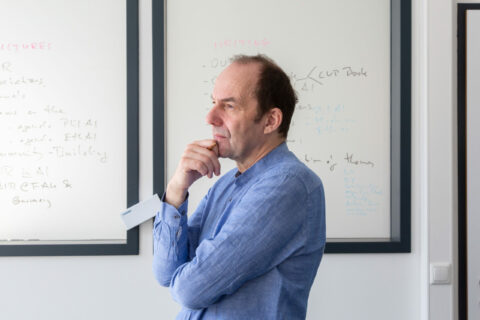Artificial Intelligence (AI) recommendations for the German government

A panel of top researchers has made seven specific recommendations to the German federal government. The recommendations were developed and unanimously adopted during the summit meeting of Alexander von Humboldt professors in the field of AI last week in Aachen.
The Alexander von Humboldt Professorship is the most valuable German research award and is granted exclusively to top researchers who are world leaders in their field. The Alexander von Humboldt Professorships for Artificial Intelligence form an essential part of the German government’s AI strategy. One of the experts is Prof. Dr. Vincent Müller from the Faculty of Humanities, Social Sciences, and Theology.
For this reason, “we hope for a positive response to and support of our recommendations,” says Humboldt Professor Holger Hoos, one of the directors of the AI Center at RWTH Aachen University.
The proposals range from quite general recommendations on financial support for AI research in Germany to very specific proposals such as the development of AI computing and data centers as a critical factor for long-term AI-based innovation. Merely to build on existing infrastructure is not enough, the experts say.
“A few weeks ago,” Hoos explains, “the federal government announced investments in the AI sector.” Details are not yet available, but the researchers hope that the Aachen recommendations will offer useful guidance on how to spend the available funds effectively so “we don’t fall further behind China and the U.S.”
Seven Recommendations on Artificial Intelligence (AI) to the German Federal Government
The following recommendations were developed and unanimously adopted by all experts present during the summit meeting of Alexander von Humboldt Professors for Artificial Intelligence, which took place under the patronage of the Alexander von Humboldt Foundation in Aachen on September 27 and 28, 2023.
- Providing financial support for AI research in Germany based on a broad view of the technology that also includes relevant non-technical disciplines such as the cognitive sciences, natural sciences, social sciences, and ethics.
- Ensuring technological independence in the field of AI, which is essential for our economy and society. Achieving this goal will require very substantial investments at the national and EU levels. This spending should match investment in the U.S. and China.
- Establishing large, dedicated AI computing and data centers as a critical component of long-term AI-based innovation. Simply extending existing high-performance computing infrastructure cannot be considered a viable solution as the requirements for setting up and operating the new AI centers are highly specific.
- Continuing to provide funding for Alexander von Humboldt Professorships in Artificial Intelligence, ensuring a greater diversity of candidates, especially by allowing appointment of non-German professors.
- Providing funding for additional ERC research projects. There are several AI-focused ERC research proposals each year that are considered to be worthy of funding (“above threshold”) in the stringent ERC evaluation process, but actually do not receive any funding due to budget limits. We recommend that these proposals be quickly financed from national budgets, with funding to be spent within a German research institution.
- Creating structures to ensure that a greater number of AI experts are involved in the development of national AI policies and strategies (e.g., by establishing a standing committee or advisory board) and that these are implemented quickly and effectively. These structures should be managed at the federal minister or secretary of state level, ensuring that decisions can be made effectively and in good time according to need.
- The Federal Government should be advised on AI-strategic matters, for example on the efficient and effective structuring of AI funding, by the Alexander von Humboldt Professors for Artificial Intelligence. This group of internationally experienced top researchers has world-leading expertise in the field of AI. We are ready to take on this challenge!
The following 19 Humboldt Professors for AI have developed and signed the list of recommendations:
- Prof. Dr. Wil van der Aalst (Process and Data Science, RWTH Aachen University),
- Prof. Dr. Oliver Brock (Robotics, TUBerlin),
- Prof. Dr. Samarjit Chakraborty (Sustainable Computing, planned), Universität Passau
- Prof. Dr. Peter Dayan (Artificial Intelligence and Neurosciences, University of Tübingen, and Max Planck Institute for Biological Cybernetics)
- Prof. Dr. Hector Geffner (Machine Learning and Reasoning, RWTH Aachen University)
- Prof. Dr. Holger Hoos (AI Methodology, RWTH Aachen University)
- Prof. Dr. Yaochu Jin (Nature-Inspired Artificial Intelligence, Bielefeld University)
- Prof. Dr. Vincent C. Müller (Theory and Ethics of Artificial Intelligence, FAU Nürnberg)
- Prof. Dr. Sayan Mukherjee (Artificial Intelligence, Leipzig University and Max Planck Institute for Mathematics in the Sciences)
- Prof. Dr. André Platzer (Logic of Autonomous Dynamical Systems, Karlsruhe Institute of Technology)
- Prof. Dr. Marcus Rohrbach (Multimodal Reliable AI, Technische Universität Darmstadt)
- Prof. Dr. Daniel Rückert (AI in Medicine, Technical University of Munich)
- Prof. Dr. Angela Schoellig (Robotics and AI, Technical University of Munich)
- Prof. Dr. Suvrit Sra (Artificial Intelligence, Technical University of Munich)
- Prof. Dr. Radu Timofte (Artificial Intelligence and Computer Vision, University of Würzburg)
- Prof. Dr. Heike Vallery (Artificial Intelligence in Control and Automation Engineering, RWTH Aachen University)
- Prof. Dr. Ingmar Weber (Artificial Intelligence and Societal Computing, Saarland University)
- Prof. Dr. Aimee van Wynsberghe (Applied Ethics of Artificial Intelligence, University of Bonn)
- Prof. Dr. Angela Yu (Computational and Cognitive Neuroscience, TU Darmstadt)